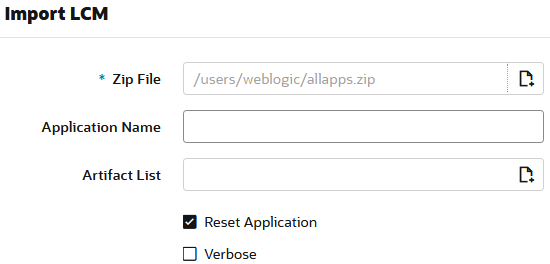Import LCM
The Import LCM job in the Essbase web interface enables you to restore Essbase cube artifacts that were backed up to an Essbase Lifecycle Management (LCM) ZIP file.
To run this job, you need at least user role with Application Manager permission, or, you must be the power user who created the application.
Before you start, locate the Lifecycle Management (LCM) ZIP file that was created using the Export LCM job (or the LcmExport: Back Up Cube Files CLI command).

To restore cube artifacts from a Lifecycle Management (LCM) ZIP file:
-
On the Home page, click Jobs.
-
From the New Job menu, select Import LCM.
-
Select the LCM export ZIP file.
-
Enter the target application name.
-
Select the Artifact List, if applicable.
If server-level artifacts were included in the LCM export, you can select the artifact list to also include server-level artifacts on LCM import.
-
Select or clear Reset Application.
Choosing to reset the application deletes the existing application and replaces it with the provided LCM file. If reset application is not selected, and the specified application name is the same as an existing application, the Import LCM job fails.
-
Select whether to use verbose descriptions.
Choosing Verbose enables extended descriptions.
-
Click Submit.
Notes
To check the job status, click on the Actions menu to the right of the job and select Job Details.
After the LCM import completes, you may need to take further action to restore migrated connections to external sources. To do this, open the connection and enter the password.
LCM Import does not migrate location alias credentials. You must replace your location alias credentials, either by recreating location aliases using MaxL, or by editing the location alias credentials in the XML exported by LCM Export.
Lifecycle Management (LCM) import operations (and Migration Utility import) are not supported for migration of federated partitions. Federated partitions must be recreated manually on the target.
Rollback from a patch, to a version that’s older than what was used to configure the Essbase instance, is not supported. In this scenario, importing applications from LCM in the Essbase web interface can fail after rollback.
See also: LcmImport: Restore Cube Files.